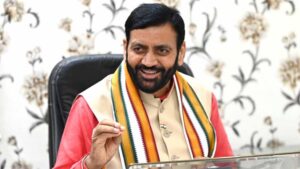
An IIT alumnus, former IRS officer and former Chief Minister of Delhi, Arvind Kejriwal is the founder and president of the Aam Aadmi Party (AAP). The youngest political party to be recognized as a national party. The AAP holds a full majority government in two states and has MLAs in five states. The party also boasts the youngest member of Parliament in the upper house.
AAP under the leadership of Arvind Kejriwal, has reshaped Indian politics, especially in North India, through its outstanding welfare schemes in education, healthcare, and basic life amenities.
Kejriwal resigned as an IRS officer in 2006 to moved his career from Public service to social service. He joined the Anna Andolan for the Lokpal Bill in 2011 and soon became a leading face of the protest. Kejriwal decided to tackle people’s issues by gaining electoral power. He founded the Aam Aadmi Party (AAP) on November 26, 2012. Kejriwal contested the 2013 Delhi Assembly election and, fortunately, found success in his first election only. The AAP won 28 out of 70 seats, defeating then-Chief Minister Late Sheila Dikshit of the Congress. She had been in power from last 15 years. Congress dropped to 8 seats from 43, while BJP secured 32 seats. The Bahujan Samaj Party (BSP), meanwhile, disappeared from the house entirely. Since no party secured a clear majority, forming a government required alliances.
Arvind Kejriwal became the Chief Minister of Delhi with the support of 8 Congress MLAs. However, he resigned after just 49 days due to his inability to deliver on promises because of the alliance’s limitations. It was the first time Indian voters experienced such a move, as traditionally, opposing parties have formed alliances and compromised on ethics to complete their tenure.
In the 2015 Delhi Assembly election, something extraordinary happened. The AAP gained 67 out of 70 seats, while the BJP won just 3 seats, despite its landslide victory in the 2014 general election. After this historic win, Kejriwal introduced several reforms that transformed the lives of Delhiites.
He spearheaded tremendous reforms in education, healthcare, and daily life necessities. He transformed government schools into world-class institutions, introduced the Happiness Curriculum, spoken English classes, and the Entrepreneurship Project. The transformation of Delhi’s government schools gained international recognition, with the First Lady of the United States visiting one of the schools during her India trip.
Arvind Kejriwal also took unprecedented steps to make electricity and water free for Delhi residents. At a time when other states were gradually increasing electricity and water prices, the AAP government introduced free electricity and water schemes, which created waves across the country. Kejriwal’s policy in healthcare is also appreciated a lot.
Kejriwal’s governance style has revolutionized how welfare policies are implemented, making him a key figure in Indian politics.
for more updates follow ANN MEDIA on facebook , X , Instagram and Linkedin







